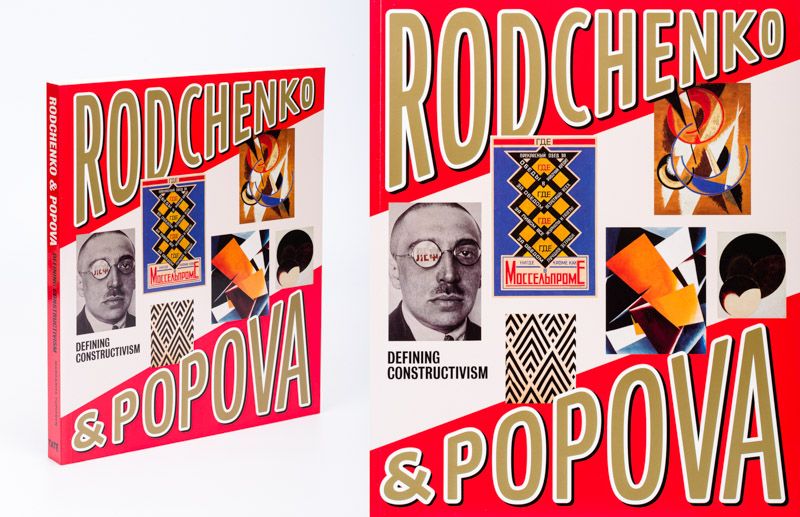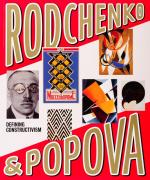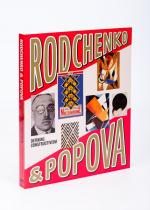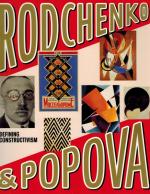[Rodchenko, Rodchenko & Popova: Defining Constructivism.
Rodchenko & Popova: Defining Constructivism.
London, Tate Publishing, 2009. 23,5 cm x 28 cm. Frontispiece, 190 pages with illustrations throughout. Original Softcover. Excellent condition with only minor signs of wear.
Includes for example: Being-in-Production: The Constructivist Code / Plates / His and Her Constructivism / Commentary on Drawings / The Line etc.
Aleksander Mikhailovich Rodchenko (5 December [O.S. 23 November] 1891 – December 3, 1956) was a Russian artist, sculptor, photographer and graphic designer. He was one of the founders of constructivism and Russian design; he was married to the artist Varvara Stepanova.
Rodchenko was one of the most versatile Constructivist and Productivist artists to emerge after the Russian Revolution. He worked as a painter and graphic designer before turning to photomontage and photography. His photography was socially engaged, formally innovative, and opposed to a painterly aesthetic. Concerned with the need for analytical-documentary photo series, he often shot his subjects from odd angles—usually high above or down below—to shock the viewer and to postpone recognition. He wrote: “One has to take several different shots of a subject, from different points of view and in different situations, as if one examined it in the round rather than looked through the same key-hole again and again.” (Wikipedia)
Lyubov Sergeyevna Popova (April 24, 1889 – May 25, 1924) was a Russian avant-garde artist (Cubist, Suprematist and Constructivist), painter and designer.
Popova was born in Ivanovskoe, near Moscow, to the wealthy family of Sergei Maximovich Popov, a very successful textile merchant and vigorous patron of the arts, and Lyubov Vasilievna Zubova, who came from a highly cultured family. Lyubov Sergeyevna had two brothers and a sister: Sergei was the eldest, then Lyubov, Pavel and Olga. Pavel became a philosopher and the guardian of his sister’s artistic legacy. She grew up with a strong interest in art, especially Italian Renaissance painting. At eleven years old she began formal art lessons at home; she was first enrolled in Yaltinskaia’s Women’s Gymnasium, then in Arseneva’s Gymnasium in Moscow. By the age of 18 she was studying with Stanislav Zhukovsky, and in 1908 entered the private studios of Konstantin Yuon and Ivan Dudin. In 1912 to 1913, she began attending the studios of the Cubist painters Henri Le Fauconnier and Jean Metzinger.
As early as 1917 in parallel with her Suprematist work, she had made fabric designs and worked on Agitprop books and posters, In the Tenth State Exhibition: Non Objective Creativity and Suprematism, 1918, she contributed the architectonic series of paintings. She continued painting advanced abstract works until 1921. In the 5 x 5 Exhibition of 1921, Popova and her four fellow Constructivists declared that easel painting was to be abandoned and all creative work was to be for the people and the making of the new society. Popova worked in a broad range of mediums and disciplines, including painting, relief, works on paper, and designs for the theater, textiles, and typography. Popova did not join the Working Group of Constructivists when it was set up in Moscow in March 1921, but joined by the end of 1921. In 1923 she began creating designs for fabric to be manufactured by the First State Textile Printing Works in Moscow.
From 1921 to 1924 Popova became entirely involved in Constructivist projects, sometimes in collaboration with Varvara Stepanova, the architect Alexander Vesnin and Alexander Rodchenko. She produced stage designs: Vsevolod Meyerhold’s production of Fernand Crommelynck’s The Magnanimous Cuckold, 1922; her Spatial Force Constructions were used as the basis of her art teaching theory at Vkhutemas. She designed typography of books, production art and textiles, and contributed designs for dresses to LEF.
She worked briefly in the Cotton Printing Factory in Moscow with Varvara Stepanova. (Wikipedia)
- Keywords: Aleksander Mikhailovich Rodchenko · Catalogue Four – International Art · Catalogue Six – Photography · Constructivism · Design – Rare · Inanna Modern – Art Books · Russian Art · Russian Avantgarde
- Language: English
- ISBN: 9781854377968
- Inventory Number: 110049AB
EUR 70,--
© 2025 Inanna Rare Books Ltd. | Powered by HESCOM-Software












